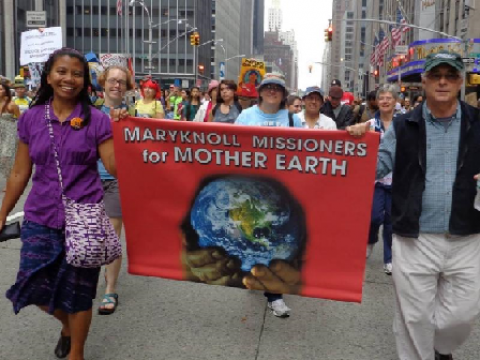
Chloe Schwabe reflects on the mission of the Maryknoll Office for Global Concerns as part of the Christian call to share the Good News.
As a young college student, I had the opportunity to study abroad in Ecuador and spend eight days deep in the Ecuadorean Amazon in Yasuni National Park. On the way, we saw the pollution and devastation of oil drilling, the flaring of natural gas from platforms above the lush canopy, and met an indigenous community member who talked about an oil company who was dividing the community and bribing leaders to secure rights to drill for oil in their Secoya territory. This experience was deeply formative for me both personally and professionally.
It took seeing the destruction of the Amazon forest with my own eyes and full senses to have this conversion moment. Just as Doubting Tomas needed to touch Jesus’s wounds to believe he had risen and had appeared to the other disciples, sometimes we need to witness with our own eyes both the miracles and the sins to direct our hearts and strengthen our faith to walk the path towards justice that Jesus called us to follow. While the scriptures encourage us to trust that God is right there with us all the time, these signs of hope and suffering can give us the encouragement to know that God is present.
After the Resurrection, Jesus’s disciples set out to share the Good News with all people far and wide. They sold all their belongings and distributed the proceeds with those in need. They lived simply and communally. We too can incorporate these actions into our own lives to ensure a more equitable and sustainable world.
At the Maryknoll Office for Global Concerns, our mission is to carry the experiences of Maryknoll missioners, and the teachings of our faith, to transform the hearts and minds of policy makers. Similarly to Jesus, we seek to challenge the structures of oppression and injustice that keep people in poverty or fear and that destroy creation.
We don’t do this work alone, but as a community. Here in D.C., we work in community with our interfaith partners and partners in the broader social movement. We also work in virtual community with Maryknoll missioners and supporters across the country and the world to awaken members of Congress, the Administration, financial institutions, and others to see policy through the eyes of the most vulnerable around the world. It is certainly a unique form of ministry.
Most recently for me, my experience as a college student came full circle. In collaboration with the episcopal conferences in South America and the U.S., religious communities, and Caritas, we welcomed a delegation of 18 indigenous, religious, and peasant farmer leaders from the Amazon region to D.C. in April 2017. This collaboration is known as the Pan-Amazonian Ecclesial Network. One religious sister accompanied isolated communities around Yasuni National Park. We were able to create platforms for all of them to speak with policy makers and the public to share their challenges, such as the encroachment of oil companies on the territories of these uncontacted communities around Yasuni.
Sister Elsie Monge and the Ecumenical Center for Human Rights in Ecuador (CEDHU) similarly advocate on behalf of Amazonian and other indigenous communities throughout Ecuador facing threats to their human rights. It is from the spirit of her work in mission that we support delegations like REPAM when they come to D.C. to ensure they can share their stories directly with policy makers. The human face and stories, when told directly, can catalyze change that would otherwise be much more difficult to achieve without their witness.
Beyond advocacy, much can be done in community too. We also seek to educate missioners and supporters about how to live in a way that creates more harmony with creation. Whether that is buying less, buying local, reducing fossil fuel consumption, growing your own food, or working cooperatively and equitably, we recognize that our actions and lifestyles in the world can either heighten or relieve the challenges communities face in the Global South.
We live in a global moment when divisiveness, hate, and fear are driving conflicts and suffering. But by being Easter people, renewed with hope, we can turn divisiveness to unity, hate to love, and fear to hope. Just as the disciples set out to carry on Jesus’s ministries, we too can be the prophets our time calls us to be by speaking out against injustice, working in community, and living simply.
